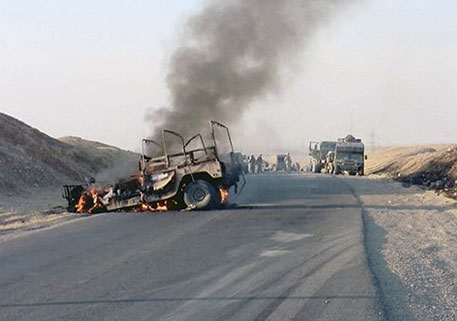Time running out
 In November 1950, Army Sgt. James Sharp went missing east of the Chosin Reservoir, North Korea. Not named on any prisoner of war (POW) lists and with no account for his whereabouts, he was reported missing in action on Dec. 6, 1950, and later, after prolonged lack of evidence, was declared deceased on Feb. 17, 1954.
In November 1950, Army Sgt. James Sharp went missing east of the Chosin Reservoir, North Korea. Not named on any prisoner of war (POW) lists and with no account for his whereabouts, he was reported missing in action on Dec. 6, 1950, and later, after prolonged lack of evidence, was declared deceased on Feb. 17, 1954.
In October 1954, during what was known as Operation Glory, the U.S. Army Graves Registration Service recovered American remains from the Korean Demilitarized Zone. Sharp’s remains were not among them, and he was declared unrecoverable.
But in 2011, information from two Korean witnesses led a recovery team from the Defense POW/MIA Accounting Agency (DPAA) to the remains of at least seven individuals along the eastern bank of the Chosin Reservoir. DNA analysis has now positively identified Sharp as one of the seven individuals, and his remains will finally be interred with the honor he deserves.
Despite numerous successful recoveries, a lack of funding threatens to disrupt further missions, casting a shadow on the hope of many survivors who—decades later—still await closure after the loss of their loved one.
“Funding for [fiscal year] 2017 operations is uncertain,” said Vincent Darcangelo, DAV interim POW/MIA Committee chairperson. “Currently, the planned operation budget is $20 million underfunded.”
Darcangelo said Congress has mandated that DPAA account for and identify at least 200 sets of remains per year. However, the funding for this year’s budget will be inadequate to complete the DPAA’s 2017 operations.
“We have just received word that the joint field activity (JFA) scheduled for early 2017 in Cambodia has been canceled due to a lack of funding,” Darcangelo said. “This was the only JFA scheduled for Cambodia during 2017, and the cancellation came about in spite of a continuing resolution and assurances there would be no negative impact, and funds were adequate.”
According to DPAA’s website, the U.S. has worked with nations like Cambodia for more than two decades to continue recovery missions to account for Americans still missing from past conflicts. Unfortunately, the organization has had to cancel 19 recovery and 17 investigative missions, which reduced planned field operations by 40 percent.
DAV is faithfully continuing its efforts to work with DPAA and other veterans groups to fully account for the 82,608 service members still missing from past conflicts and to advocate for former POWs.
At the 2015 DAV National Convention in Denver, assembled members unanimously voted to pass a resolution urging Congress to enact legislation that would increase recognized presumptive illnesses for former POWs and expand eligibility for Dependency and Indemnity Compensation to surviving spouses of totally disabled former POWs.
But this legislation, among other POW/MIA–centric issues, remains unsupported.
“I continue to be impressed and grateful for all that DAV does for our veterans, current and past, returned and—as is the case for those we represent—our unreturned veterans who are being seriously underserved,” said Ann Mills-Griffiths, Chairwoman and CEO of the National League of POW/MIA Families. “We are deeply concerned and disappointed that necessary funding to sustain expanding the pace and scope of these field operations has not been made available. We need DAV’s help in convincing Congress that an additional $20 million in operational funds for [fiscal year] 17 is quickly made available. Time is running out for Vietnam War families and veterans seeking answers.”
In 2016, DPAA accounted for and identified 91 World War II service members, 91 Korean War service members and 17 Vietnam War service members. So far in 2017, remains of 13 service members have been recovered and identified.
“One of the sacred bonds of trust between our country and its service members is that we do not leave anyone behind,” said National Commander Dave Riley. “I would hate to see money be the obstacle preventing closure for these families or for the support former POWs and spouses have earned. We’ll continue working with DPAA in the hope that our government will support these efforts until every missing American has been accounted for.”






